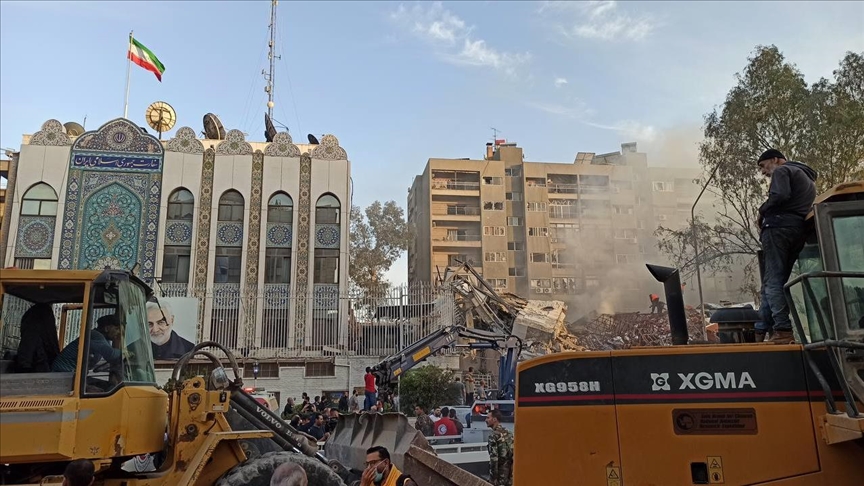7 IRGC officers, including top commander, killed in suspected Israeli attack on Iran’s Consulate in Syria
Senior commander of Islamic Revolutionary Guard Corps’ Quds force in Syria and Lebanon, his deputy and 5 others killed in strike, says IRGC's public relations wing
 Debris is being cleared away after the Israeli attack on the Iranian consulate in which the commander of the Iranian Islamic Revolutionary Guard Corps (IRGC), Mohammad Reza Zahedi, was killed in Damascus, Syria on April 01, 2024.
Debris is being cleared away after the Israeli attack on the Iranian consulate in which the commander of the Iranian Islamic Revolutionary Guard Corps (IRGC), Mohammad Reza Zahedi, was killed in Damascus, Syria on April 01, 2024.
ISTANBUL
A top commander of Iran’s Islamic Revolutionary Guard Corps (IRGC) and six other officers were killed in a missile strike targeting the Iranian Consulate in the Syrian capital, Damascus, on Monday.
In a statement, IRGC's public relations wing announced the killing of Gen. Mohammad Reza Zahedi, a senior commander of the IRGC's Quds Force in Syria and Lebanon, his deputy Gen. Hadi Haj Rahimi and five other military personnel in a strike on a building housing the Iranian Embassy's consular section in the Syrian capital.
The five other slain men were identified as Hossein Amanollahi, Seyyed Mahdi Jalalati, Mohsen Sadaqat, Ali Agha Babaei and Syed Ali Salehi Rozbahani, all officers of IRGC.
The statement said Israel carried out the attack "following its irreparable defeat against the Palestinian resistance", referring to the ongoing Israeli onslaught on the Gaza Strip, which has killed more than 32,800 people, mostly children, since October 7.
It further said the transfer, funeral and burial of the slain IRGC officers will be announced at a later date.
Zahedi was a veteran IRGC commander who previously commanded the IRGC's ground force and air force and also served as the deputy commander of the IRGC's military operations.
The missile strike reportedly targeted a building that served as the Iranian Embassy's consular affairs department as well as the residence of the Iranian ambassador.
Iranian Ambassador to Syria Hossein Akbari and his family were unhurt.
Speaking to the media after the attack, Akbari said the building was attacked with F-35 warplanes and six missiles, killing several Iranian military undersecretaries.
Akbari said the attack is against all international conventions and will see a "decisive response."
Israeli Army Radio, however, said the Iranian Embassy was not the target of the attack, but a nearby building serving as an IRGC military headquarters in Damascus was bombed, without acknowledging that the attack was carried out by Tel Aviv.
In a statement, the Syrian Defense Ministry said the attack took place at around 5:00 p.m. local time, accusing Israel of carrying out the attack from the Golan Heights.
The ministry said its air defenses downed some of the missiles but the attack led to the "complete destruction" of the building and killing and injuries of everyone present inside.
Syrian Foreign Minister Faisal Mekdad, who visited the Iranian Embassy following the attack, condemned what he termed a "vile terrorist attack," blaming it on Israel.
In a phone conversation with Mekdad, Iran's Foreign Minister Hossein Amir-Abdollahian said the attack was in breach of international conventions and warned that Israel "will be responsible for its consequences."
Iran's Foreign Ministry spokesman Nasser Kanaani also issued a statement saying the attack was against the 1961 Vienna Convention and said Iran reserves the right to respond at the time and place of its choosing.
The attack came amid heightened tensions in the region in the wake of the Israeli onslaught on the Gaza Strip.
Earlier, there were reports about the presence of senior Palestinian leaders in the targeted building, including Islamic Jihad leader Ziad al-Nakhaleh.
Nakhaleh and Hamas chief Ismail Haniyeh were both in Tehran earlier this week where they held talks with senior Iranian leadership.
Meanwhile, thousands of people gathered at the Palestine Square in central Tehran to protest against the strike on the Iranian Consulate in Syria, calling for a stern response.
The protesters chanted vociferous slogans against both Israel and the US.









